Do you feel extremely nervous when you have to converse with native Italian speakers? I know I do. Despite having studied the language for over ten years, I still experience sweaty palms and a lump in my throat whenever I find myself speaking to someone new.
Today, we will be exploring a language learning app that should quell many of these insecurities. Dubbed LangAI, it is specifically designed to provide language learners with a secure and non-judgmental space to practice their speaking skills, no matter their level.
Ethics statement: I downloaded LangAI for my personal use and paid for the subscription myself. I was not asked to write anything about this product, nor was I provided with any sort of compensation. You will not find any affiliate links in this article.

What is LangAI?
LangAI is the brainchild of Federico Ruiz Cassarino, a Uruguayan software engineer who, according to an article on the BBC, was inspired to create an AI-based language learning app after successfully learning English in the UK, not through traditional academic methods, but by speaking as much as possible.
With LangAI, you can speak or chat with an AI chatbot in over 20 languages, including Italian. Powered by ChatGPT4, it offers live corrections and adaptive, personalised conversations to help you rapidly improve your language skills and learn from your mistakes.
At the moment, it is only available for iPhone but the company is actively working on an Android version of the app. If you opt for the free version of LangAI, there is a daily limit imposed on your usage, but by subscribing to the paid plan, you are free to chat with the bot from dawn until dusk if you please!
How to Use LangAI
The LangAI interface is really simple. When you first open app, you’ll be presented with a screen that resembles a chat. The bot will greet you in Italian and ask for your name, to which you can respond by pressing the microphone button at the bottom and speaking into your phone. The bot will then ask a few more questions, such as where you live and what your hobbies are, until you are asked to register for an account. You can then decide if you want to continue with the free version or sign up for the paid plan. At the time of writing, it costs $3.99 per month or $29.99 for the annual plan.
Whenever you open the app from then on, the bot will greet you and ask you how your day is going or if it’s the evening, how it went. From there, you can start up a conversation about any topic you wish. As you speak, the bot will provide you with what LangAI calls “live corrections,” picking you up on grammar errors as you speak.
LangAI – Pros and Cons
Now let’s take a look at the various pros and cons of using LangAI as a virtual Italian tutor.
Overcome your fear of talking
The biggest advantage of LangAI is that it helps you overcome your fear of speaking and making mistakes in another language. Even advanced learners, such as myself, can find it relaxing to speak to a bot without the concern of being judged for their errors. Personally speaking, I also find that the more I use the app, the more comfortable I feel conversing with it.
Doesn’t share controversial opinions
I’ve found that LangAI works best if you talk freely about yourself rather than ask it questions. This is because the bot is not designed to have personal opinions. In fact, if you ask the bot its opinion about something, it will often respond by saying:
Come assistente virtuale/chatbot, non ho opinioni personali.
As a virtual assistant/chatbot, I don’t have personal opinions.
This is especially true if you ask the bot what it thinks about specific individuals, such as controversial political figures. Instead, it will provide you with very basic facts about the individuals in question.
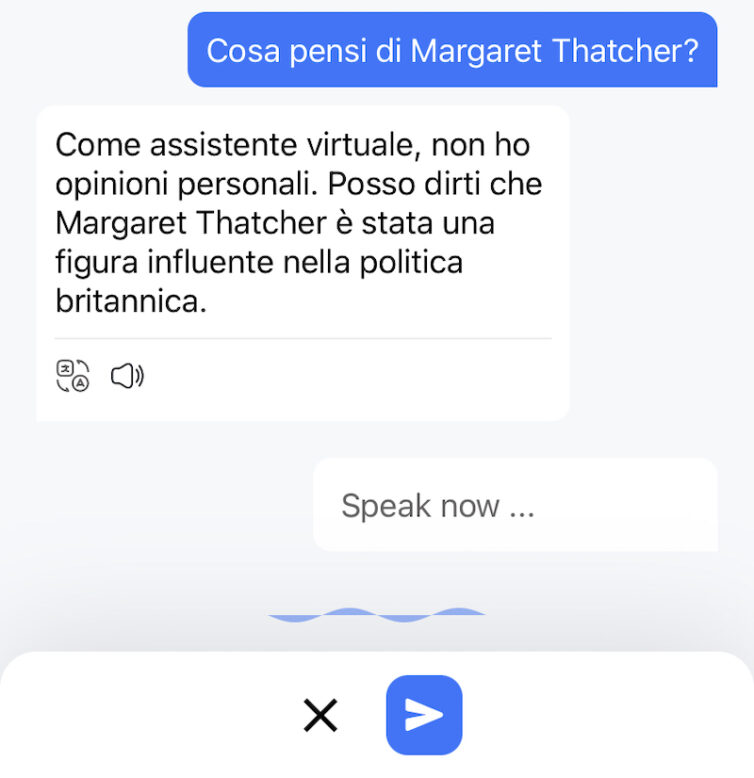
I personally like this approach as it ensures that the bot avoids spreading misinformation or promoting hate speech.
That said, the bot will make up interests, preferences and hobbies in order to sound like a more natural conversation partner. For example, I once asked “If you could eat anything right now, what would it be?” to which it responded “Una pizza margherita“.

Use it wherever, whenever
Unlike a tutor, you can talk to the bot whenever you have a free moment, be it at the crack of dawn, before you go to bed or while waiting for the bus. This encourages you to speak more than you normally would, especially if you don’t live in the country where your target language is spoken.

Lacks certain qualities of a human tutor
As an AI language model, LangAI lacks certain qualities of a human tutor. One notable difference is its tendency to ask numerous questions without sharing its own personal experiences or thoughts. This can lead to a one-sided interaction at times, resembling an interrogation. Additionally, LangAI defaults to addressing users as male, which may be off-putting for some female users.
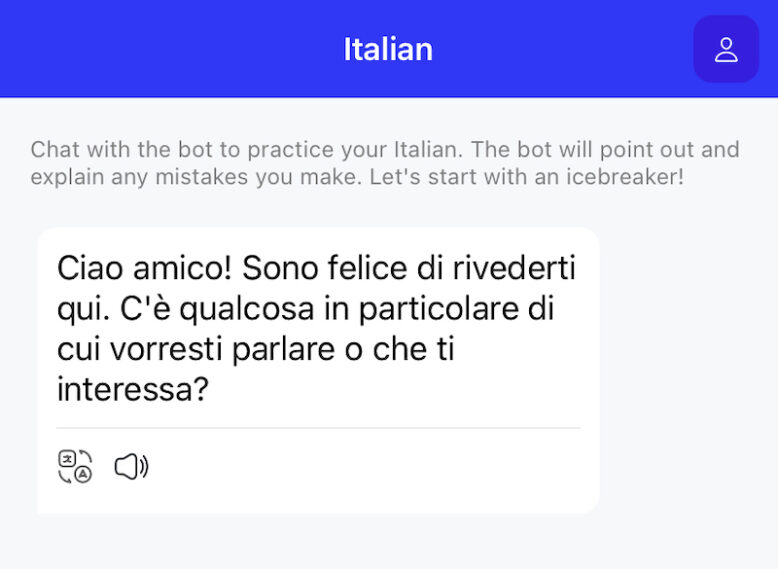
That being said, the voice in the current version sounds almost human, which is a significant improvement compared to the previous version of the app, where the voice sounded more computerised.
In future versions, it might be beneficial to include an option for users to input their gender for Romance languages. This way, at the very least, the bot would be able to adapt its language accordingly and address users using the appropriate gendered terms.
Grammar corrections galore
In my conversations with the app, I received numerous excellent lexical and grammatical corrections and feedback, accompanied by explanations regarding the reason for the error. At times, the app even subtly rephrases a sentence to enhance its native-like quality.
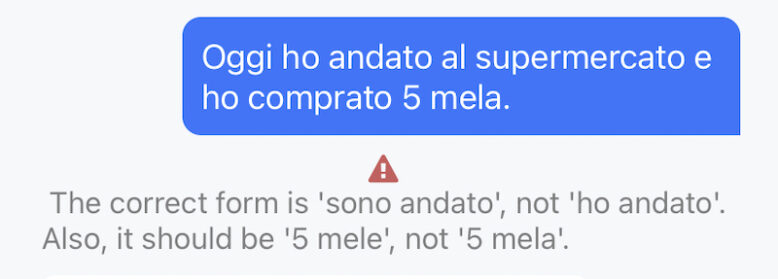
The only aspect it still seems to struggle with is correcting the subjunctive mood. As you can see in the example below, it did not correct my improper usage of the subjunctive in the sentence “Vuoi che vado con te?” (The correct grammar is “Vuoi che vada con te“).
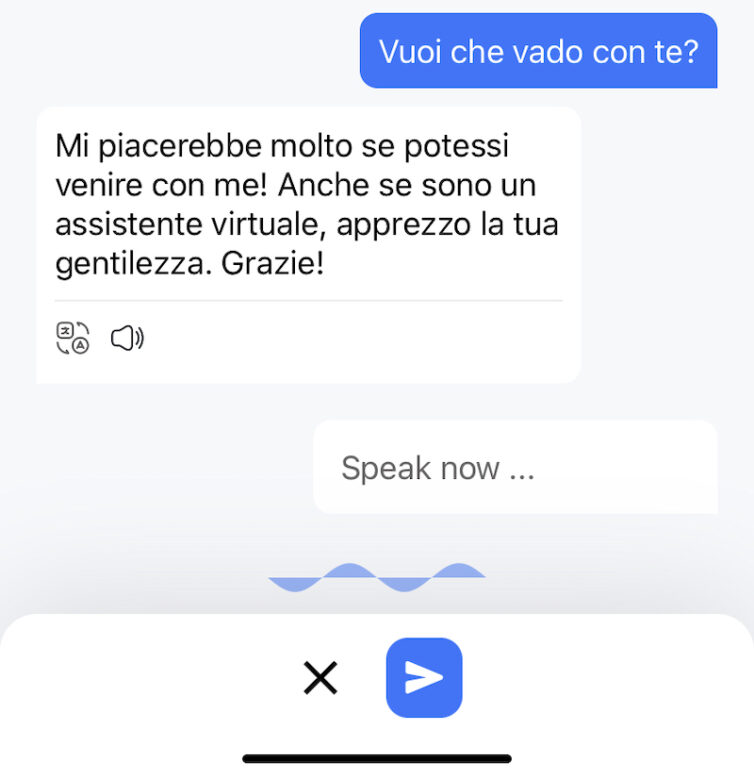
Records information from previous conversations
In the updated version of the app, you will receive daily notifications referencing something you mentioned during a previous conversation and asking further questions about that specific topic. For example, I mentioned reading “Tess of the D’Urbervilles” during one of our chats, and a few days later, the bot inquired if I’d finished reading it and then followed up with a question about my day.
While I do find this approach engaging, it does raise concerns about the app’s data retention. In our email exchange, the founders stated that:
“LangAI retains the information privately which allows it to dynamically add relevant previous messages and information to the context window, making the conversations more engaging and human-like.”
Still, to safeguard your privacy, it’s absolutely crucial not to disclose any truly personal information during your chats. In fact, I would even recommend inventing fictional events or interests while interacting with the bot to ensure that no sensitive data gets recorded. There’s no harm in being extra cautious!
Very good at interpreting speech
Provided you speak clearly, keep the phone close to your mouth and avoid overly intrusive background noise, LangAI does an excellent job of interpreting your speech. It may misunderstand the odd word, but I would say that 99% of the time, it is spot on.
A bit buggy at times
LangAI, which was launched in March 2023, is a relatively new app, so it does have the tendency to be a bit buggy at times. Very occasionally, the bot won’t respond or I’ll receive an error message, in which case I need to close the app and start over again.
What’s more, the bot will sometimes tell me that I made a lexical or grammar mistake that I did not actually make. For example, it once told me to say “è vero” (it is true) instead of “e’ vero“. (Here, the bot used the incorrect accent when interpreting my speech.) In this case, it is best to ignore the bot and continue chatting.
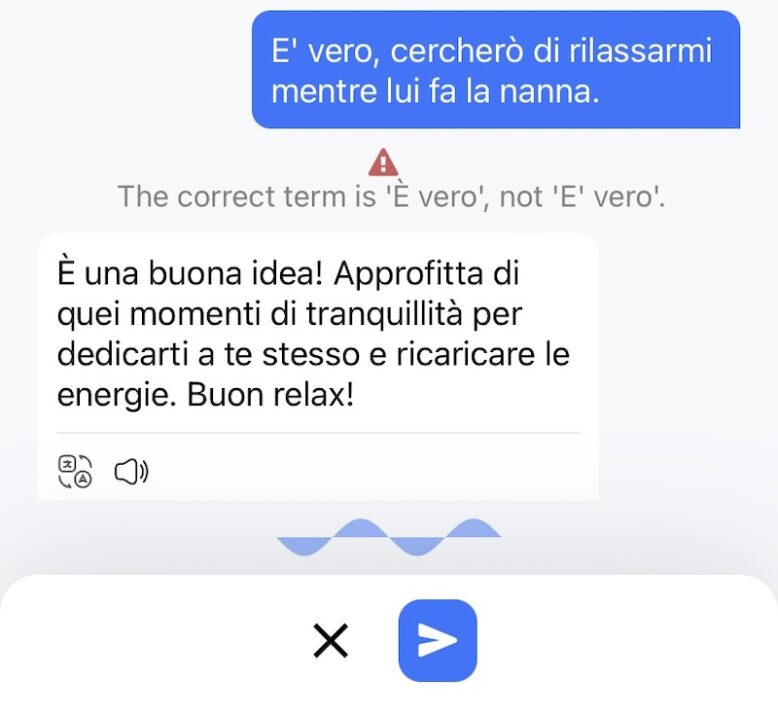
Very affordable
As mentioned above, the monthly price is more or less the same as una tazza di caffè (a cup of coffee), and it becomes even cheaper if you subscribe to the annual plan.
Final Thoughts
Despite the odd flaw, I am thoroughly impressed with LangAI and the broader trend of using AI for language learning. I believe that when used in conjunction with other study methods, it has the potential to be a valuable asset in improving fluency, especially when the opportunity to converse with a native speaker arises. Moreover, considering the rapid advancements in AI technology, I am sure that the LangAI app will only continue to grow stronger with each update.
Why not give it a try and see if it works for you!
Heather Broster is a graduate with honours in linguistics from the University of Western Ontario. She is an aspiring polyglot, proficient in English and Italian, as well as Japanese, Welsh, and French to varying degrees of fluency. Originally from Toronto, Heather has resided in various countries, notably Italy for a period of six years. Her primary focus lies in the fields of language acquisition, education, and bilingual instruction.


